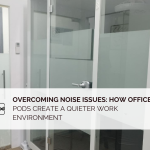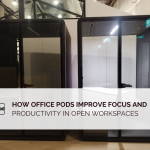No pods added to your quote request yet. Add some now for a free quote!
Adapting to the Future of Work: Office Pods in Modern Offices
The modern workplace is undergoing a significant transformation, driven by evolving work styles, technological advancements, and a heightened focus on employee well-being. Among the various innovations reshaping office environments, office pods have emerged as a pivotal element in adapting to the future of work. These compact, versatile spaces are redefining how organizations approach productivity, collaboration, and employee satisfaction
-1-1-e1722584177616.jpg)
Understanding Office Pods
Office pods are standalone, often modular structures within open-plan offices designed to provide private or semi-private workspaces. They come in various sizes and configurations, ranging from small soundproof booths for focused work to larger collaborative pods equipped with video conferencing technology. The primary appeal of office pods lies in their ability to offer flexibility and adaptability within modern office layouts.
Enhancing Focus and Productivity
One of the most significant benefits of office pods is their impact on focus and productivity. In open-plan offices, noise and constant interruptions can hinder concentration and efficiency. Office pods address this challenge by providing quiet, enclosed spaces where employees can work without distractions. These pods are often designed with acoustic materials to reduce noise pollution, creating an environment conducive to deep work and creative thinking.
By incorporating office pods, organizations can cater to different work styles and tasks. Employees who require uninterrupted time for complex projects or sensitive tasks can benefit from the seclusion and soundproofing of these pods. As a result, productivity levels can increase, and employees can complete their tasks more efficiently.
Fostering Collaboration and Innovation
While office pods are excellent for focused work, they also play a crucial role in fostering collaboration and innovation. Many pods are designed with collaboration in mind, featuring modular seating, whiteboards, and interactive screens. These features make them ideal for small group meetings, brainstorming sessions, and informal discussions.
The integration of technology in office pods further enhances their collaborative potential. With built-in video conferencing capabilities and connectivity options, employees can easily connect with remote team members, clients, or partners. This seamless communication fosters a more inclusive and collaborative work environment, breaking down geographical barriers and encouraging the exchange of ideas.
Supporting Employee Well-Being
Employee well-being has become a central concern for modern workplaces, and office pods contribute significantly to this aspect. The ability to retreat to a private space for focused work or relaxation can help reduce stress and improve overall job satisfaction. Many office pods are designed with ergonomic features, such as adjustable seating and proper lighting, to ensure comfort and support.
Moreover, office pods can serve as quiet areas for employees to recharge or engage in personal activities. This flexibility supports work-life balance and allows employees to manage their energy levels throughout the day. By prioritizing well-being, organizations can create a more positive and productive work environment
Adapting to Hybrid Work Models
The rise of hybrid work models, where employees split their time between the office and remote work, has further underscored the need for adaptable office spaces. Office pods offer a solution to this challenge by providing flexible and multifunctional spaces that can be easily reconfigured to meet changing needs.
In a hybrid work model, office pods can serve as dedicated areas for employees who come into the office on specific days or for those who require a temporary workspace. Their modular nature allows organizations to adjust the layout and functionality of their office spaces in response to evolving work patterns and employee preferences.
Designing for the Future
As organizations look to the future, the design and implementation of office pods will play a crucial role in shaping the modern workplace. Key considerations include integrating sustainable materials, ensuring accessibility, and incorporating advanced technologies. By focusing on these aspects, organizations can create office pods that are not only functional and flexible but also aligned with broader sustainability and inclusivity goals.
In conclusion, office pods represent a significant advancement in office design, offering a versatile solution to the challenges of the modern workplace. By enhancing focus and productivity, fostering collaboration, supporting employee well-being, and adapting to hybrid work models, office pods are poised to play a central role in the future of work. As organizations continue to evolve, embracing innovations like office pods will be essential for creating dynamic and effective work environments that meet the needs of a diverse and evolving workforce
Back



